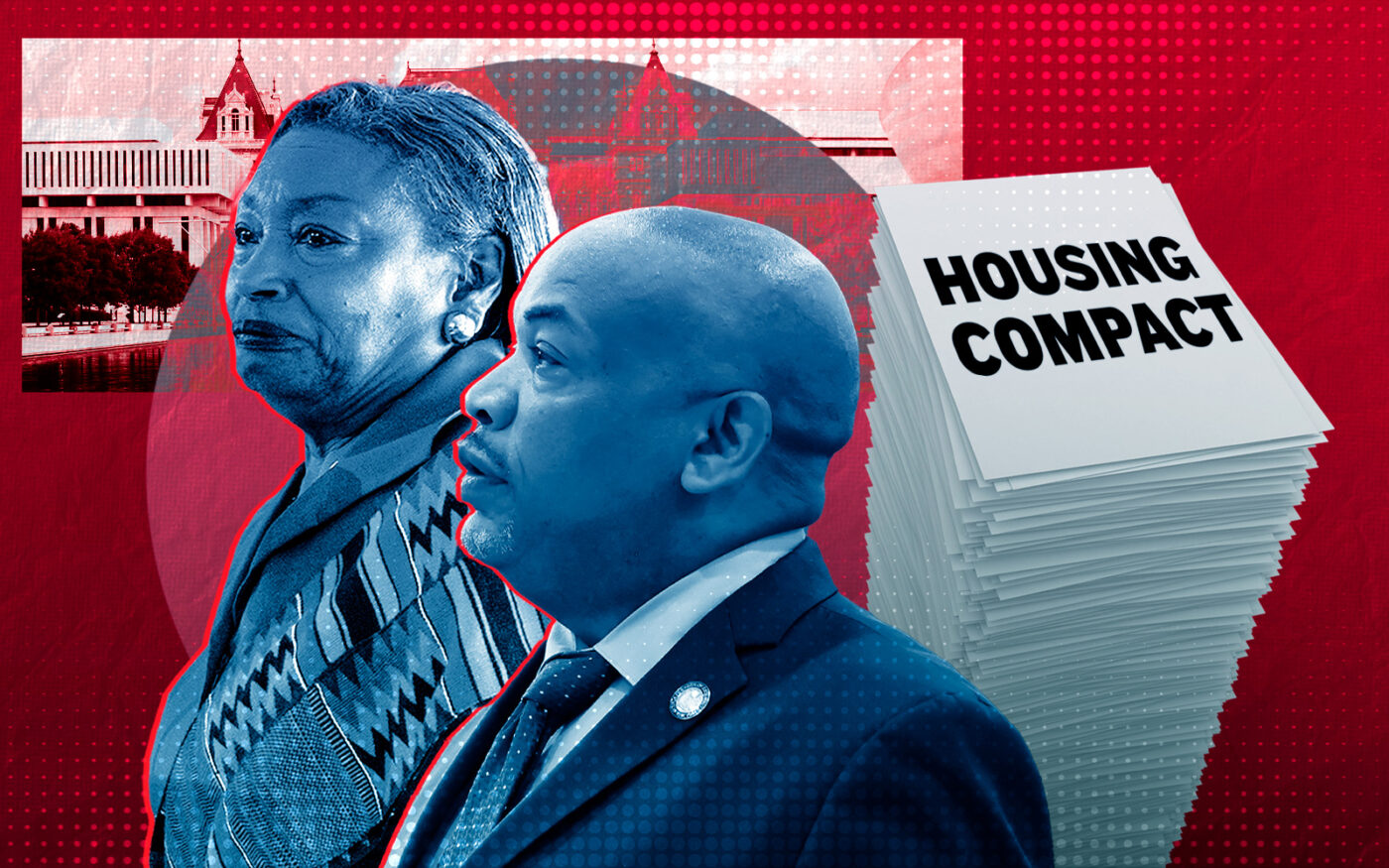Trending
Albany to real estate: drop dead
Senate, Assembly budget bills ignore 421a, FAR cap, Hochul housing plan

State lawmakers thumbed their nose Tuesday at the real estate industry and Gov. Kathy Hochul.
The Senate and Assembly released budget resolutions that leave out a key extension for the property tax break 421a and water down the governor’s plan to set housing growth targets statewide.
The measures, released by the Democratic majorities of the Senate and Assembly, are the chambers’ response to the governor’s executive budget, and signal a starting point for negotiations. The state budget is due by April 1.
Much can change in the last two weeks of budget negotiations, but the exclusion of industry priorities indicate that lawmakers are not willing to accept them without a fight, or without gaining something in return.
“The state legislature continues to ignore the city’s rapidly growing rental housing supply crisis,” REBNY president Jim Whelan said in a blistering response. “The legislature’s big ideas are to spend hundreds of millions of dollars on ‘planning’ for housing outside New York City and a new program for limited-equity co-ops rather than support the governor’s proposals that would actually directly spur meaningful rental housing production.”
The governor had pitched extending the construction deadline for 421a by four years, which would give projects that became eligible for the break by pouring foundation footings before it expired last June until June 2030 to finish construction.
Developers have pushed for the extension, arguing that without it, they will not be able to move forward with their projects. The 2026 deadline was imposed because the previous time 421a expired, projects sat idle for years yet remained in line for the benefit.
Lawmakers at the time did not want that to happen again, but did not consider that the deadline would make financing some large projects impossible.
A survey by the Real Estate Board of New York found that at least 32,000 units of housing — many of them income-restricted — would not be built without the extension, as builders face rising construction costs and lenders don’t want to risk financing projects that might miss out on the tax break.
Its exclusion from the legislature’s one-house bills is not a surprise. Last year, lawmakers spurned a proposal put forward by the governor to replace the tax break. During a joint hearing this month, Senators and Assembly members spoke out against extending the 421a deadline, though Sen. Liz Krueger commented that a carveout for specific projects would be “reasonable.”
The Senate budget resolution indicates that the chamber will “address projects on an individual basis outside of the budget process” — a reference to large projects with substantial affordability, such as Halletts North.
But such a framework could create a new political obstacle for developers to surmount and could subject them to new demands for affordable units and other community benefits.
Both chambers are frosty to the idea of providing tax breaks for multifamily housing, but favor incentives over mandates to spur housing construction throughout the state.
The governor’s “New York Housing Compact” would set three-year housing growth targets: 3 percent for downstate localities and 1 percent for those upstate. Areas that ignore the targets would be subject to builder’s remedy, meaning that developers could get new housing approved regardless of local zoning.
The Senate and Assembly would instead offer $500 million in incentives for localities to meet housing goals. The Assembly proposed that localities receive an initial payment for submitting housing growth plans and then more cash if they meet the 1 and 3 percent targets.
The governor’s proposal faces considerable opposition from suburban lawmakers, who want local control of zoning to remain absolute. The one-house budget bills respond to that pressure. They exclude not only builder’s remedy but the governor’s Transit-Oriented Development Act, which would require localities to allow 15 to 50 housing units per acre within a half a mile of train stations.
The bills leave out language that would lift the city’s residential floor area ratio cap. Raising it would let the city increase residential density and make it easier to convert office buildings into housing.
Under current zoning, only office buildings constructed before 1961 can be converted to have residential space exceeding an FAR of 12. An exception is Lower Manhattan, where office buildings constructed between 1961 and 1977 and exceeding 12 FAR can be converted to housing.
The governor’s budget plan would extend the city’s most flexible zoning to buildings constructed before 1990. The Senate resolution appears to combine that change with affordability levels required under a proposed tax incentive for office-to-residential conversions. The Senate supports a tax break that includes labor requirements and extends beyond the city.
The Assembly plan neither includes the tax break nor expands the kinds of commercial buildings that can be converted. Without any state action, the city could still expand the exception enjoyed by Lower Manhattan office buildings to other commercial districts. But it lacks the state’s power to provide financial incentives.
The one-house resolutions also exclude the governor’s proposal to replace the tax break J-51 and another that would create a 421a-like program outside the city. They additionally leave out language that would authorize the city to legalize basement apartments.
For tenant advocates, the measures are a mixed bag. The Senate’s resolution notes that the chamber “supports advancing tenant protections that align with the core principles of good cause eviction,” but does not actually include the measure. The Assembly avoids the term, but similarly notes that it will “explore pathways to protect tenants from arbitrary and capricious rent increases and unreasonable evictions of paying tenants.”
Tenant organizer Cea Weaver of Housing Justice for All said she is thankful that Senate and Assembly leaders “opened the door to negotiations on good cause.”
The Senate and Assembly measures again seek to create a state-based housing voucher program, as well as $250 million to fund it. The Assembly measure adds $385 million for rental arrears statewide. The housing industry has said at least $2 billion is needed.
Read more

Here are the real estate policies to watch in Hochul’s budget
These resolutions are non-binding, and Gov. Kathy Hochul has reportedly indicated that she is willing to negotiate past the budget deadline to achieve her priorities.
“I would like an on-time budget — I’m not planning on one that’s not,” she said Monday, according to the New York Post. “But I also know that I’m here to do the work of the people of New York state, and they expect me to not leave town until the job’s done.”




